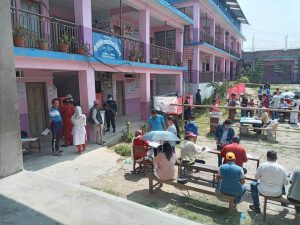4-H Nepal conducted a comprehensive New Voter Education Program in the lead-up to the Federal and Provincial Elections in Nepal. Twenty-five events were organized for voter education in collaboration with the Election Commission of Nepal and other partners. This report outlines the objectives, activities, outcomes, and challenges encountered during the implementation of the program.
1. Introduction:
The Federal and Provincial Elections in Nepal are critical events in the democratic process of the country. Ensuring the informed and active participation of citizens is essential to uphold the principles of democracy. The Voter Education Program aimed to raise awareness, educate voters, and promote civic engagement among the Nepalese population.
2. Objectives:
The main objectives of the Voter Education Program were as follows:
a. To inform citizens about the electoral process and their voting rights.
b. To promote voter registration and turnout.
c. To encourage informed decision-making by providing information about candidates and their platforms.
d. To foster a culture of civic responsibility and participation.
3. Activities:
The program included the following key activities:
a. Voter Registration Drives: 4-H Nepal organized voter registration drives in communities to ensure eligible citizens were registered to vote.
b. Information Campaigns: Informational materials, including pamphlets, posters, and social media campaigns, were used to educate citizens about the electoral process, voting rights, and the importance of voting.
c. Candidate Forums: Public forums were organized where candidates from various political parties could present their platforms and answer questions from the public.
d. Workshops and Seminars: Educational workshops and seminars were conducted to provide in-depth knowledge about the electoral system and how to make informed choices.
e. Mock Elections: Mock elections were held in schools and communities to familiarize citizens, especially first-time voters, with the voting process.

4. Outcomes:
The Voter Education Program achieved the following outcomes:
a. Increased Voter Registration: A significant increase in voter registration was observed in the areas where the program was implemented.
b. Higher Voter Turnout: The voter turnout in the Federal and Provincial Elections exceeded previous elections, indicating improved civic engagement.
c. Informed Voters: Citizens were better informed about the electoral process, candidates, and their platforms, leading to more informed voting decisions.
d. Civic Awareness: The program contributed to the development of a sense of civic responsibility and an understanding of the importance of democratic participation.
5. Challenges:
During the implementation of the Voter Education Program, some challenges were encountered:
a. Limited Resources: Insufficient funding and resources posed challenges in reaching all targeted communities effectively.
b. Accessibility: Some remote and marginalized communities faced difficulties accessing the program’s activities.
c. Voter Apathy: Overcoming voter apathy in certain regions was challenging, requiring extra efforts to engage citizens.
6. Conclusion:
The Voter Education Program conducted by 4-H Nepal played a crucial role in enhancing voter awareness, increasing voter registration, and promoting civic participation during the Federal and Provincial Elections in Nepal. Despite challenges, the program successfully contributed to the democratic process, ensuring that citizens were well-informed and active participants in the elections.
7. Recommendations:
To further improve future voter education programs, the following recommendations are proposed:
a. Secure Adequate Funding: Seek additional funding sources to ensure broader program coverage.
b. Expand Outreach: Develop strategies to reach remote and marginalized communities more effectively.
c. Continuous Engagement: Continue to engage citizens in civic education beyond election cycles to maintain a culture of civic responsibility.
d. Evaluation: Conduct a thorough evaluation of the program to identify areas for improvement and assess its long-term impact.
4-H Nepal remains committed to promoting civic engagement and democratic participation in Nepal and will continue its efforts to educate and empower citizens in future elections.

